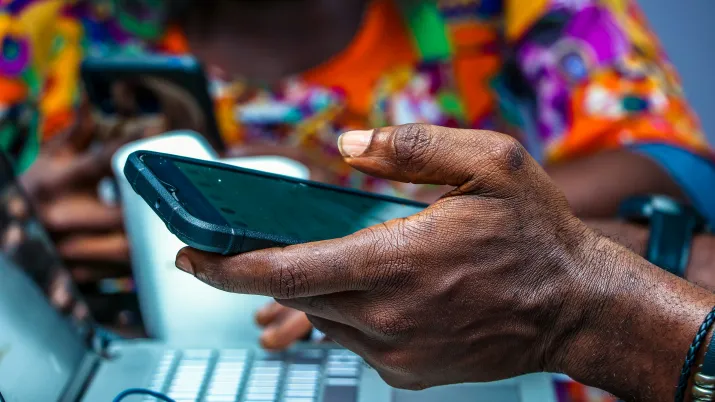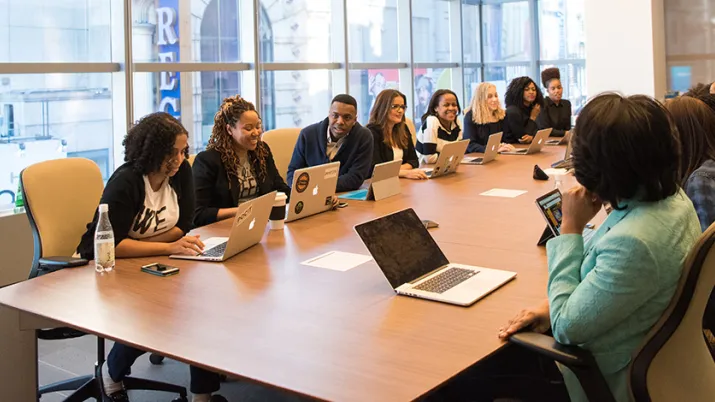Share the page
Our work in innovation and development

As France’s international development cooperation agency, we view innovation as a powerful lever for sustainable development and national sovereignty. Through our projects, we promote inclusive, responsible, sustainable innovation in support of the digital, environmental and social transitions of our partner countries.
Our approach is rooted in a fundamental principle: innovation only creates meaningful impact when designed locally, co-created with sector stakeholders, and aligned with sustainable development priorities.
Our work with our partner countries aims to reduce technological and social divides, improve access to technology, training and finance, transform local economies, establish ethical frameworks for digital governance (particularly of AI), and encourage the pooling of proven solutions and shared quality standards.
$4.8 trillion
According to the “2025 Technology and Innovation Report” by United Nations Trade and Development (UNCTAD), the AI market could reach $4.8 trillion by 2033 – equivalent to the GDP of Germany. The report also estimates that 40% of global jobs may be impacted by AI-driven automation.
Our strategic priorities
Our innovation and development support activities centre around four main priorities:
- Capacity building: We provide technical assistance to investors, public institutions and entrepreneurship support organisations through training and mentoring. This helps build inclusive innovative ecosystems
- Innovation financing: We help set up mechanisms such as subsidies, competitiveness grants, and zero-interest unsecured loans to boost access to finance for startups and innovative SMEs. We also help public bodies streamline these tools to foster entrepreneurship and innovation
- Green and digital transitions: We assist our partners in promoting and developing eco-friendly technological solutions, and engage with the private sector, academia and civil society to co-develop impactful innovation
- Open innovation and public-private dialogue: We promote co-innovation between the public and private sectors by organising hackathons and multi-stakeholder workshops. We also encourage South-North and South-South cooperation on innovation policy and help co-develop regulations adapted to emerging technologies
We adopt modern and innovative approaches in emerging technologies:
- Artificial intelligence (AI): We assist partner countries in designing national strategies, building capacity, and piloting responsible AI applications for innovation and sustainable development and improved public service delivery
- Geospatial technologies: We support local space-tech and the use of satellite data to address priority issues like climate change mitigation and adaptation
“Support for the digital economy and innovation development is central to Expertise France’s strategy [...] While innovation can drive inclusive and green development, we’ve noticed it can also reinforce inequalities. That’s why we’ve accelerated our commitment to supporting innovation and entrepreneurship ecosystems over the past four years.”
- CEO of Expertise France

Our framework for action
Our work aligns with French and European innovation priorities and is fully embedded within the European Global Gateway initiative, which seeks to raise up to €300 billion by 2027 to support high-quality, sustainable infrastructure in digital, energy, transport, health, education and research.
We also work to the commitments of the Presidential Council for International Partnerships (April 2025), which reaffirmed France’s intention to make strategic technologies – such as AI and geospatial technology – core priorities in development policy. These sectors are recognised as drivers of transformation, strategic autonomy and international reach.
For further reading
Our services in this area
As a public agency, we offer our international partners a wide range of services that include capacity building and support for public policies on innovation. Through our work, we:
- Train policy makers on technological issues
- Develop regulatory frameworks that support innovation
- Promote co-innovation between public, private and academic stakeholders
- Co-develop local green and digital innovations
- Set up subsidies, grants and zero-interest no-collateral loans to facilitate access to financing for innovative startups and SMEs
- Facilitate regional and sector-based innovation networks
- Strengthen EU-partner cooperation via joint innovation programmes
Our cooperation on AI
In 2023, we launched a strategy to address the challenges of AI while maximising its economic and social benefits. Our work centres around four pillars that encourage inclusive, sustainable use of AI in our partner countries:
- Sustainable growth and AI adoption: Promote AI for productivity gains, especially in SMEs, and enhance public service delivery
- AI capacity development: Help emerging countries harness AI by investing in robust data infrastructure and training, including high-performance computing centres, improved connectivity, and training programmes tailored to market needs
- Equitable AI access: Ensure inclusive AI adoption by reducing regional and gender gaps, support urban-rural equity, and increase women’s participation in AI
- Responsible and ethical AI: Develop transparent, safe, fair regulatory frameworks, while fostering international and regional dialogue on best practices and harmonisation

Our cooperation on geospatial technologies
We have developed pilot geospatial services and a strategy aimed at harnessing the full potential of these technologies. These services are based on three pillars:
- Economic development: Support the emergence of local space-tech service providers to address national and regional challenges
- Research and innovation: Leverage new technologies such as satellites and data processing tools (AI, Big Data)
- Governance and public policy: Promote the use of space data to foster sustainable development in the Global South, particularly in agriculture, climate risk management, climate change, and natural resource governance
We are implementing this approach in Africa, Latin America and Asia. Our initiatives range from awareness raising and training to technical assistance, prototyping, and support to local space agencies and geospatial data governance.
Resource for download
Our projects
Digital development and innovation for Rwanda
Ongoing
2023 - 2025
Funders : Agence Française de Développement
Key figures
- 1,718 people trained in new technologies
- 615 organisations supported in their digital transition



